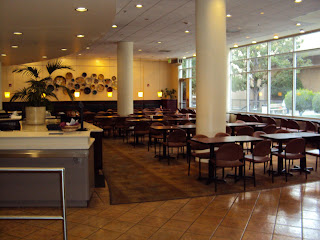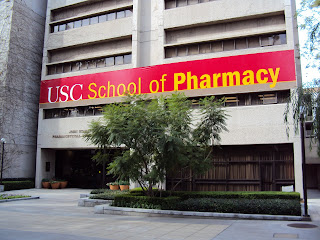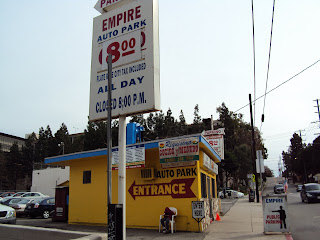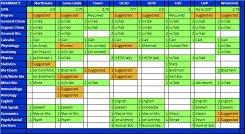Taking a closer look at what's inside the info packet. Most of the sheets in that top row were covered in previous posts, but it's time to take a closer look at the Dual Degree Programs sheet, the USC brochure, and the USC Pharmacy magazine.
-- USC Pharmacy magazine
It's a pretty cool magazine. Has articles on events the school has thrown, updates from the faculty, awards given to faculty/students, and articles on health care. I'll be reading it more in depth later. However, most of that info probably won't be duplicated here on this blog. Most of it isn't immediately relevant to getting into pharmacy school.
One thing that I will share. I was confused in my notes during the intro portion of the presentation about what I meant by "Safety Net Clinic". From skimming through the magazine, I found out that a Safety-Net Clinic" is a clinic that delivers "health care services to low income, homeless and other vulnerable populations". As I do more research on what will happen to me after graduating from pharm school *crosses fingers*, it's definitely going to be important to know terms like that.
-- USC Brochure
I'm calling it a brochure, but it's just as thick, if not thicker, than the USC Pharmacy magazine. The table of contents includes
- Overview
- About the School
- Dean's Message
- Calendar
- Administration & Support Groups
- Pharmacy Career Opportunities
- Facilities, Services, & Organizations
- Admissions
- Academic Policies
- Registration, Tuition & Payment
- Financial Aid
- Degree Programs
- Courses of Instruction
- Faculty
- Health Sciences Campus Map
- Contact Information
That's a pretty comprehensive set list of topics. If I was to say what major topic was the Info Session lacking, it would have been talking about the actual program. The theory of the way they teach, and what their program offers and does exceptionally well or makes them unique among other campuses. But at least this brochure contains a list of all the classes they offer, along with a brief description of each.
The other topics that I'm more immediately intrigued by are Organizations, Career Opportunities, Academic Policies, and Degree Programs.
Organizations is just a passing matter. Every school is going to have something to join, and it will be different from school to school. That's something that may be a pro for one school over another, but reality is that it's one of the criteria that's near the bottom when it comes to choosing a school.
Career Opportunities is certainly something I should be looking into now. The clearer the picture I have in my head of what my future is going to be like, the more motivated I can become, and the more confident I will be able to present myself when it comes time for the interview.
Academic Policies is more of a curiosity right now. I'm not in any school yet, but it's interesting to see how things are run. Like for instance, what kind of GPA you have to maintain before being kicked out of the program. (It starts at 2.5 by the end of the first semster or 2.8 by the end of year one, 2.8/2.9 for year two, 2.9/3.0 for year three, and it stays at 3.0 for year four.)
And the most important item on that list is this last one. What kind of degree programs are offered is a huge deal. I know I've been in school a long time, and quite a few dual degree programs require more time than just getting a PharmD alone, but the idea of getting a dual degree appeals to me very much. Whereas what organizations a school offers is fairly low on my list, the dual degree programs is fairly high.
And with that said... let's go on to the last item in the Info Packet that I want to cover...
-- Dual Degree Programs
Here is a list of the dual degrees that USC offers, as well as links to the appropriate page on their website:
- Doctor of Pharmacy/
M.S. Gerontology (or Certificate in Gerontology)
- Doctor of Pharmacy/
M.S. Regulatory Science
- Doctor of Pharmacy/
Juris Doctor (Law)
- Doctor of Pharmacy/
Master of Business Administration
- Doctor of Pharmacy/
Master of Public Health
- Doctor of Pharmacy/
Doctor of Philosophy
Something important to keep in mind that I learned from our tourguide. You will have to take the appropriate standardized exam (such as the GRE) to get into many of these programs.
And something very important that I learned during the introduction presentation. USC holds a couple info sessions each year, geared specifically towards their dual degree programs. The next one will be on April 30th, same time (2-4pm), and they will be about the Gerontology, Regulatory Science, and MPH programs.
While USC has some prerequisites that I may not finish before my first round of applications are turned in, that dual degree info session is something I'm interested in attending. I know UCSF partners with UCBerkeley in getting an MPH, and there may be other schools that I come across that also offers one or more of these degrees. So if I'm able to attend, I may be back at USC come April 30th.
-- Conclusion
Truthfully, I don't think I'll be applying to USC during my first round of applications. The different schools have different prerequisites, and USC has the most. I don't think I'll be able to fit them all in by the time I apply. It also has the higher GPA requirement, which I don't think I'll also be able to meet, even with straight A's. I just have too many units to be able to raise my GPA fast enough.
With that said, the trip was well worth it. The presentation was very nice, even though the tour was very minimal, due (in part) to the fact that the presentation ran on a bit long. (Or that's the feeling I got at least.) The school is beautiful though. I love the idea of having a volleyball court right outside the building (if I got accepted in the dorms.) The selection of dual degrees is impressive. And well... the presenters all came off very sincere and enthusiastic. There is no reason that I could see that would automatically make me cross USC off my list, if it weren't for my own failings in being able to meet their requirements in time.
And that's it. That's the end of this series of posts about the USC Info Session. The next school may possibly be WesternU on April 12th.





































